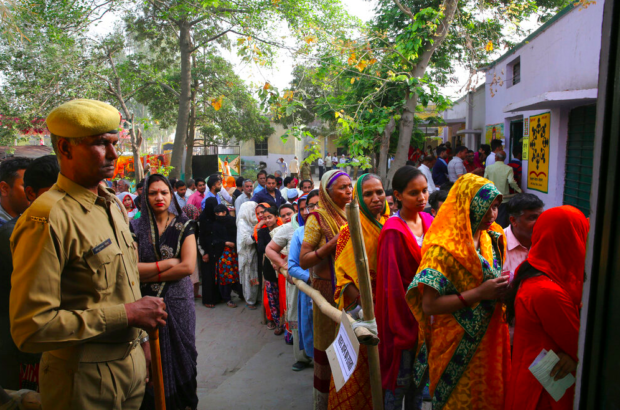Polls open in 1st phase of India’s lengthy general election

Indians stand in queues to cast their votes at a polling booth for the first phase of general elections, near Ghaziabad, India on April 11, 2019. AP
NEW DELHI — Polls opened Thursday in the first phase of India’s general elections, seen as a referendum on Prime Minister Narendra Modi and his Bharatiya Janata Party.
A festive spirit prevailed as men and women in colorful clothes made their way to heavily guarded voting stations in large numbers.
In the world’s largest democratic exercise, voters in 18 Indian states and two Union Territories are casting ballots on Thursday, the first day of a seven-phase election staggered over six weeks in the country of 1.3 billion people.
Modi supporters say the tea seller’s son from Gujarat state has improved the nation’s standing. But critics say his party’s Hindu nationalism has aggravated religious tensions in India.
Thursday’s voting is important for the BJP as it had won only 32 of 91 seats in the previous 2014 elections. It is seeking to improve its tally this time.
Article continues after this advertisementVoting also began for two parliamentary seats in the Indian-controlled portion of disputed Kashmir amid tight security and a boycott call by Muslim separatists who say the polls are an illegitimate exercise. Armed police and paramilitary soldiers in riot gears guarded polling stations and nearby roads.
Article continues after this advertisementShops, businesses and most schools were closed on Thursday in response to a strike called by separatist leaders who challenge India’s sovereignty over Kashmir and seek right to self-determination for the entire territory as demanded by United Nations resolutions.
In the northern Baramulla area, many people said they came out to vote only against Modi’s BJP, calling it an “anti-Muslim” and “anti-Kashmiri” party. They opposed the BJP’s election manifesto, which promised to scrap decades-old special rights for the Kashmiris under India’s Constitution. The special status prevents outsiders from buying property in the territory.
“I didn’t want to vote but then there’s an imminent threat by politicians like Modi who are up in arms against Kashmiris,” said Abdul Qayoom, a voter in Baramulla town. “They’ve taken our rights, now they want to dispossess us from our land. We want to stop people like Modi.”
The voting follows a sweeping crackdown with police arresting hundreds of Kashmiri leaders and activists. Authorities also banned the movement of civilian vehicles on a key highway to keep it open exclusively for military and paramilitary convoys two days a week during India’s general election.
Some 900 million people are eligible to cast ballots at around a million polling stations across India.
They will decide 543 seats in India’s lower house of Parliament. Voting concludes on May 19 and counting is scheduled for May 23.
Modi came to power in 2014 and the party invoked its Hindu nationalist roots before the elections, with Modi at the forefront against the threat of Pakistan, India’s Muslim-majority archrival. Hindus comprise about 80% of India’s 1.3 billion people.
Even though India continues to be one of the fastest-growing economies in the world, the Modi-led government’s performance on the economy has come under criticism.
The first item in the opposition Congress party’s election manifesto describes a plan for creating jobs. It also promises an income subsidy program for the poorest families and for farmers. /ee